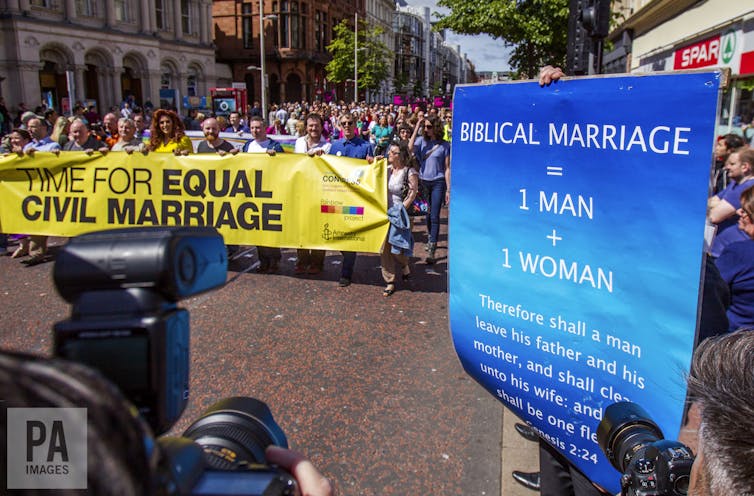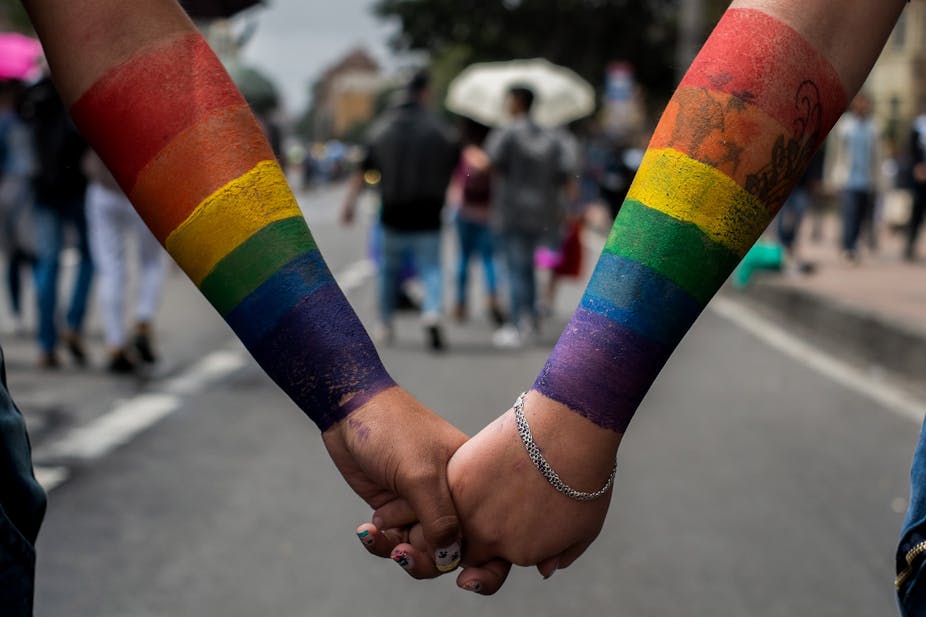The recent referendum in Colombia was expected to end the 60-year conflict between the government and and the leftist guerrilla group, the Marxist Fuerzas Armadas de Colombia (FARC).
But as well as surprising the world, the voters’ shock decision to refuse the deal also highlighted a frequently overlooked issue. Lesbian, Gay, Bisexual, Transgender, Queer and Intersex (LGBTQI) communities are frequently the losers of peace processes.
Colombia’s 2016 peace agreement seemed to stretch beyond all others in recognising LGBTQI rights. Colombian activists were signatories to the agreement, and the pact itself encouraged sexual minorities to participate in politics.
Yet the referendum on the pact failed. While it failed for a number of reasons, staunch opposition from conservatives to rights seen as “sexually liberal” figured in the story.
This is no major surprise. Rights for sexual minority groups are among the most divisive political issues confronting many states today. Civil war and peace processes, however, are particularly perilous. The harrowing plight of Syria’s gay and lesbian community in Islamic State-controlled areas is well documented.
During the transition from conflict to peace, LGBTQI communities continue to experience harassment and discrimination. Research demonstrates how these citizens are commonly subjected to violence in societies emerging from conflict. From the use of corrective rape against lesbians in post-apartheid South Africa to the targeting of gay and lesbian people in post-agreement Northern Ireland, violence of this kind is pervasive in peace process societies.
Peace processes impact on LGBTQI populations in numerous forms that are rarely acknowledged. A key factor is how contemporary civil war is understood and dealt with by policymakers. Civil war is seen to be the result of intractable conflicts between ethnic, religious or nationalist groups. Peace, according to this logic, entails guaranteeing representation for these groups in political institutions. In Lebanon, for example, a 50/50 Christian/Muslim quota system is applied for parliamentary seats and public jobs. A similar system is mooted for Syria.
These peace pacts are widely criticised for entrenching sectarianism and excluding non-ethnic groups. A growing body of scholars and policymakers note, for example, how peace processes sideline gender equality. As a result, a number of initiatives have been created to promote gender equality after conflict. The UN Security Council’s Resolution 1325 on Women, Peace and Security is a landmark proposal, affirming the importance of women’s equal participation in the promotion of peace. Some agreements reserve parliamentary seats for women.
A small number of agreements mention LGBTQI issues. In South Africa’s transition from apartheid, a prohibition against discrimination based on sexual orientation was written into the equality clause of the constitution. Nepal’s postwar constitution provides formal legal safeguards and Northern Ireland’s Good Friday Agreement ensures that public authorities are legally obliged to promote good practice for sexual minority groups and to involve them in consultation processes.
Pride and prejudice
Rare as these limited protections are, they do not always translate into long-term benefits. The Northern Irish peace process is particularly revealing. Since the signing of the 1998 agreement, records show increasing levels of homophobic attacks in the region. In fact, according to some commentators, homophobia has now replaced sectarianism as the major expression of societal hate.
Minority sexual rights are a major line of political division between Irish nationalists and UK unionists. Sinn Féin – the main nationalist party – tabled five motions in support of same sex marriage legislation for the parliament to vote on. On each occasion, the DUP – the main unionist party – used their communal veto to stop it.

LGBTQI rights represent “war by other means” in peace process Northern Ireland. They are entangled with the struggle for ethnic rights around which the peace process revolves. Irish nationalist parties support gay and lesbian rights because they see it as compatible with the advancement of the equality agenda for the nationalist community. Unionist parties resist such rights as they view them as a Trojan horse deployed by nationalists to attack unionists. And the LGBTQI community are the main losers.
A fundamental problem of peace processes is that they tend to reward religious and nationalist hardliners. Policymakers identify these strongmen as key players to fashion peace agreements. Such warlords have little reason to advance the interests of sexual minorities. Their only goal is to defend the narrow ethnic interests of their community. At worst, nationalist and religious parties take an uncompromising position. Homosexuality and lesbianism is framed as sinful or a threat to the purity of the nation symbolically imagined as the heterosexual family.
What can be done? One answer is to include LGBTQI rights in all peace agreements. As seen in the Colombian and Northern Irish examples, this can provide ammunition for those who oppose peace terms. While not a perfect solution, the inclusion of LGBTQI rights within peace agreements is still an important step. Constitutional rights makes states accountable to sexual minorities.
A more comprehensive approach is required to recognise the specific impact of peace processes on LGBTQI communities. Work is needed to provide advice, training and support for the government, judiciary, and security forces to embed rights throughout public institutions. More importantly, we need to consult with and support activists in postwar societies. Rather than mere victims, LGBTQI movements are powerful actors in challenging discrimination and in making the case for rights.

